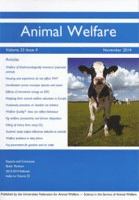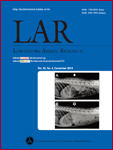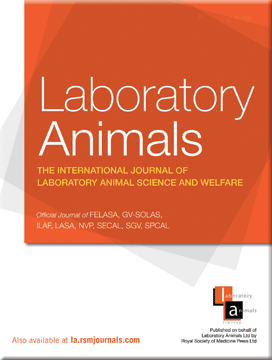
ATLA-ALTERNATIVES TO LABORATORY ANIMALS
Scope & Guideline
Leading the dialogue on humane alternatives in scientific inquiry.
Introduction
Aims and Scopes
- Promotion of Alternative Methods:
The journal emphasizes the development and validation of non-animal testing methods, including in vitro, in silico, and ex vivo approaches, aiming to replace animal models in various biomedical and toxicological studies. - Advancements in the Three Rs Principles:
Research published in ATLA often investigates novel strategies that align with the principles of the Three Rs, fostering improvements in animal welfare and the ethical conduct of research. - Interdisciplinary Research and Collaboration:
The journal encourages interdisciplinary studies and collaborations among scientists, ethicists, and regulatory bodies to enhance the acceptance and application of alternative methods in research and testing. - Regulatory Frameworks and Guidelines:
ATLA also addresses the regulatory aspects of alternative methods, discussing the implications of new laws and guidelines that promote or hinder the use of non-animal testing approaches. - Educational Outreach and Training:
There is a focus on educational initiatives aimed at training researchers and students in the use of alternative methods, emphasizing the importance of knowledge dissemination in advancing the field.
Trending and Emerging
- In Vitro and In Silico Methods:
There is an increasing trend towards the development and validation of in vitro and in silico testing methods, showcasing innovative approaches to assess drug efficacy, toxicity, and biological interactions without the use of animals. - Personalized Medicine and Human-relevant Models:
Research focusing on human-derived models, including stem cell and organoid technologies, is gaining traction, emphasizing the need for more relevant biological systems that reflect human physiology in toxicity and efficacy testing. - Integration of AI and Machine Learning:
The application of artificial intelligence and machine learning in predicting biological outcomes and optimizing experimental designs is emerging as a significant trend, enhancing the efficiency and accuracy of alternative testing methodologies. - Public and Regulatory Engagement:
There is a marked increase in discussions surrounding public perceptions and regulatory frameworks that support or challenge the use of alternative methods, reflecting a broader societal discourse on animal testing ethics. - Ethics and Welfare in Research Practices:
Emerging themes also include a strong emphasis on ethical considerations and animal welfare, driving research towards more humane practices and the justification of research methodologies.
Declining or Waning
- Traditional Animal Models:
The use of traditional animal models in research appears to be diminishing in favor of more innovative non-animal approaches, as researchers increasingly seek to avoid animal testing due to ethical concerns and regulatory pressures. - Historical Perspectives on Animal Testing:
There seems to be a waning interest in historical analyses of animal testing practices. This shift may be due to a focus on current developments and future directions in alternative methodologies rather than retrospective evaluations. - General Toxicology Studies Involving Animals:
Studies centered around general toxicology using animal models are less frequently reported, as there is a growing preference for specific and targeted alternative testing methods that provide more relevant and humane insights.
Similar Journals

ANIMAL WELFARE
Leading the way in animal welfare research and advocacy.ANIMAL WELFARE, published by Cambridge University Press, is a vital academic journal dedicated to advancing our understanding of animal ethics, welfare science, and related practices. With an ISSN of 0962-7286 and an E-ISSN of 2054-1538, the journal offers a platform for researchers and professionals to share significant findings and insights that enhance animal protection and welfare across various settings. Operating from its distinguished location in the United Kingdom, the journal boasts a commendable impact factor and is recognized in several quartile categories in 2023, including Q3 in Animal Science and Zoology, Q3 in Biochemistry, Genetics and Molecular Biology, and Q2 in Veterinary (miscellaneous). With its diverse scope, ANIMAL WELFARE plays a crucial role in influencing policy and practice while fostering multidisciplinary discourse. It is a valuable resource for anyone dedicated to improving the lives of animals and understanding the complexities involved in animal welfare research.

Animal Reproduction
Pioneering research for a sustainable future in animal reproduction.Animal Reproduction is a premier open-access journal published by the Brazilian Coll Animal Reproduction, focusing on the dynamic field of reproductive biology within both veterinary science and animal husbandry. Established in 2004, the journal has rapidly gained prominence, securing a Q2 ranking in both Animal Science and Zoology as well as veterinary disciplines as of 2023. With a growing impact factor and an engaged readership, Animal Reproduction serves as a vital platform for researchers, professionals, and students seeking to disseminate and gain insights into the latest studies and innovations in animal reproductive health and technology. Based in Brazil, the journal's content spans a wide array of topics essential for advancing the scientific understanding of reproduction in animals, thus contributing to improved practices in veterinary medicine and livestock management. The journal is indexed in major databases such as Scopus, ensuring that the research published is accessible to a global audience. Whether you're a seasoned researcher or a student looking to deepen your knowledge, Animal Reproduction is indispensable for anyone engaged in this critical area of study.

AUSTRAL JOURNAL OF VETERINARY SCIENCES
Pioneering Discoveries in Veterinary PracticesAUSTRAL JOURNAL OF VETERINARY SCIENCES is a prominent platform for innovative research in the field of veterinary science, published by UNIV AUSTRAL CHILE, FAC CIENCIAS VETERINARIAS. This journal, bearing the ISSN 0719-8000 and E-ISSN 0719-8132, serves as a vital resource for researchers, veterinarians, and students interested in advancing their knowledge in veterinary practices and animal health. With its influence reflected in its Q3 category ranking in the Veterinary (miscellaneous) field, and its Scopus rank of #95 out of 194, the journal highlights a robust commitment to disseminating valuable findings and insights. Between the years 2017 to 2024, it aims to provide open access to significant advancements and discussions in veterinary science, ensuring that vital research is accessible to a global audience. Located in Valdivia, Chile, the journal emphasizes its role in enhancing veterinary scholarship and fostering professional development within the community.

Laboratory Animal Research
Connecting minds to enhance animal research outcomes.Laboratory Animal Research is a prominent academic journal dedicated to advancing the field of laboratory animal science, providing a platform for researchers, professionals, and students focused on biochemistry, genetics, and molecular biology. Published by SPRINGERNATURE, this journal is recognized for its rigorous peer-review process and commitment to high-quality research, achieving a notable Q2 ranking in the Biochemistry, Genetics and Molecular Biology category as of 2023. Since becoming an Open Access journal in 2015, Laboratory Animal Research has fostered greater accessibility and dissemination of research findings, encouraging collaboration and innovation within the scientific community. With its ISSN 1738-6055 and E-ISSN 2233-7660, the journal is based in the United Kingdom and resides at CAMPUS, 4 Crinan St, London, N1 9XW, England. It is an essential resource for anyone involved in laboratory animal research and strives to enhance the welfare and scientific use of animals in research settings.

LABORATORY ANIMALS
Exploring the intersection of science and ethics in animal research.LABORATORY ANIMALS is a premier journal published by SAGE PUBLICATIONS INC, dedicated to advancing the field of laboratory animal science. With an impressive impact factor that places it in the Q1 quartile for both Animal Science and Zoology, and Veterinary disciplines, it ranks remarkably at #13 out of 194 in General Veterinary and #62 out of 490 in Animal Science on Scopus. Established in 1970 and set to continue its trajectory until 2024, the journal covers a wide range of topics relevant to researchers, professionals, and students interested in the ethical and scientific use of laboratory animals. Although it operates under a traditional subscription model, its high-quality publications provide essential insights into veterinary practices, animal welfare, and translational research. The journal serves not only as a critical resource for contemporary research but also as a platform for dialogue on best practices in laboratory animal care, making it indispensable for anyone invested in the advancement of veterinary and animal sciences.

SCANDINAVIAN JOURNAL OF LABORATORY ANIMAL SCIENCE
Innovating Research for Ethical PracticesSCANDINAVIAN JOURNAL OF LABORATORY ANIMAL SCIENCE, published by the Scandinavian Society of Laboratory Animal Science, serves as a critical resource for researchers and professionals in the fields of veterinary science, animal biology, and biochemistry. Since its inception in 1996, this journal has consistently aimed to advance the understanding and welfare of laboratory animals through rigorous scientific research and innovative methodologies. Although it currently holds a Q4 ranking in several categories, including Animal Science and Zoology, it remains an essential platform for disseminating findings that influence both ethical practices and scientific advancements. The journal has converged its publishing years from 1996 to 2012 and 2014 to 2024, reflecting its commitment to ongoing research discourse. While it does not offer open access, the content within promises to deliver invaluable insights to enhance the quality of laboratory practices. Situated in Denmark, the journal invites contributions that foster a better understanding of the complexities of laboratory animal science, ensuring relevance and significant impact within the global scientific community.

CZECH JOURNAL OF ANIMAL SCIENCE
Exploring the Frontiers of Animal ScienceThe Czech Journal of Animal Science, published by the Czech Academy Agricultural Sciences, is a premier open-access journal dedicated to advancing research in the fields of animal science and zoology. With an impressive ranking of Q2 in its category for 2023, it underscores its significance within the academic community, evidenced by its Scopus rank of #197 out of 490 in Animal Science and Zoology, placing it in the 59th percentile among peers. The journal has been a crucial platform for scholarly communication since its inception and has embraced open access since 2004, ensuring that research is widely available to a global audience. Targeted toward researchers, professionals, and students, the journal publishes high-quality original research, review articles, and case studies that contribute to the understanding and enhancement of animal science practices. Its commitment to rigorous peer review and its broad scope undoubtedly solidify its role as an essential resource for those engaged in animal research and agriculture, fostering continued innovation and knowledge transfer in this vital sector.

Journal of Zoological and Botanical Gardens
Championing Global Collaboration in Biological SciencesJournal of Zoological and Botanical Gardens, published by MDPI, serves as a leading platform dedicated to the interdisciplinary exploration of both zoological and botanical research. With its base in Switzerland, this open-access journal fosters global accessibility, allowing researchers and professionals to disseminate and engage with cutting-edge studies and findings in the realms of agricultural and biological sciences, as well as veterinary sciences. Holding a commendable Q2 ranking in both categories (2023) and positioned in the 68th percentile for agricultural and biological sciences (rank #61/193) and 67th percentile for veterinary studies (rank #12/35), it reflects the high quality and relevance of the publications. The journal covers a range of topics from ecological assessments to conservation strategies, aiming to bridge the gap between wildlife management and plant sciences. Researchers, professionals, and students alike will find valuable insights and opportunities for collaboration within its pages. The journal’s commitment to fostering innovative research makes it an essential resource for anyone interested in the dynamic interactions between flora and fauna.

Iranian Journal of Veterinary Research
Advancing Veterinary Science for a Healthier TomorrowWelcome to the Iranian Journal of Veterinary Research (IJVR), a prestigious platform dedicated to advancing the field of veterinary science. Published by Shiraz University, this journal plays a pivotal role in disseminating high-quality research findings amid a vibrant academic community. With its ISSN 1728-1997, and a convergence of studies from 2008 to 2024, IJVR serves as an essential resource for veterinarians, researchers, and students interested in Animal Science and Zoology. Recognized in the Q3 quartile for both Animal Science and Veterinary categories, it holds a respectable position with Scopus rankings placing it in the 54th percentile among general veterinary journals. Although it currently lacks an open access model, the journal ensures that cutting-edge veterinary research is presented with rigor and relevance, fostering knowledge that contributes to animal health and welfare. With its strategic focus on innovative methodologies, clinical practices, and the biological sciences, the IJVR is set to become your go-to source for critical advancements in veterinary research.

Journal of Veterinary Science
Pioneering Discoveries in the Heart of Seoul.Journal of Veterinary Science, published by the Korean Society of Veterinary Science, is a distinguished peer-reviewed Open Access journal that has been contributing to the field of veterinary medicine since its inception in 2000. With an E-ISSN of 1976-555X, this journal not only provides critical insights for researchers globally but also maintains a strong presence within the academic community, evidenced by its impressive ranking in the Scopus database, where it stands at 44 out of 194 in the general veterinary category, placing it in the 77th percentile. The journal’s impact factor reflects its rigorous standards and the significance of the research it publishes, all while offering unrestricted access to its content since 2006, which promotes the free exchange of knowledge. Situated in the vibrant academic atmosphere of Seoul, South Korea, the Journal of Veterinary Science aims to advance veterinary research and practice, covering a broad spectrum of topics to inspire students, professionals, and established researchers alike to push the boundaries of veterinary science.